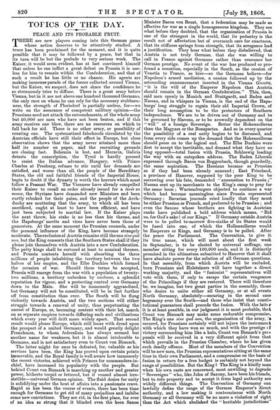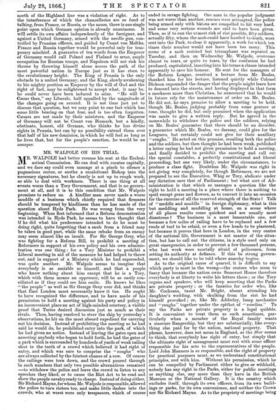TOPICS OF THE DAY.
PEACE AND ITS PROBABLE FRUIT.
THERE are new players coming into this German game whose action deserves to be attentively studied. A truce has been proclaimed for the moment, and it is quite possible that it may be followed by a peace, but that in its turn will be but the prelude to very serious work. The Kaiser, it would seem evident, has at last convinced himself that unless he can inflict a great defeat on Prussia it is use- less for him to remain within the Confederation, and that of such a result he has little or no chance. His agents are making immense parade of the forces collected around Vienna, but the Kaiser, we suspect, does not share the confidence he so strenuously tries to diffuse. There is a great army before Vienna, but in it are not above one hundred thousand Germans, the only race on whom he can rely for the necessary stubborn- ness, the strength of Florisdorf is partially useless, for—we write on the assurance of competent military opinion—the Prussians need not attack the entrenchments, of the whole army but 60,000 are men who have not been beaten, and if this army receives one blow, there are no resources on which to fall back for aid. There is no other army, or possibility of creating one. The systematized falsehoods circulated by the Austrian officials have still their effect in Europe, but close observation shows that the army never attained more than half its number on paper, and the recruiting grounds are closing fast. Bohemia is lost, and Moravia, Galicia detests the conscription, the Tyrol is hardly pressed to resist the Italian advance, Hungary, with Prince Charles at Presburg, refuses to stir until her demands are satisfied, and worse than all, the people of the Hereditary States, the old and faithful friends of the Imperial House, begin to doubt if the dynasty is worth the horrors which must follow a Peasant War. The Viennese have already compelled their Kaiser to recall an order already issued for a leve'e en masse, the Styrians have demanded new Ministers and been curtly rebuked for their pains, and the people of the Arch- duchy are muttering that the army, to which all has been sacrificed, ought at least to have been efficient, and have just been subjected to martial law. If the Kaiser plays the next throw, his stake is no less than his throne, and the Hapsburgs' merits and vices have never been those of gamesters. At the same moment the Prussian counsels, under the personal influence of the King, have become strangely moderate. The exclusion of Austria remains still the one sinequti non, but the King consents that the Southern States shall if they please join themselves with Austria into a new Confederation. The petty kings shall be restored at least to nominal thrones, and Prussia contents herself with absorbing the three millions of people inhabiting the territory between the two halves of her empire, and the Elbe Duchies which formed the occasion of war. Should these terms be accepted, Prussia will emerge from the war with a population of twenty- two millions, a territory unbroken by enclaves, a splendid reputation for vigour, and a protecting control over Germany down to the Main. She will be immensely aggrandized, but Germany will not be constituted, will be in fact further off from constitution than ever. The South will be flung violently towards Austria, and the two sections will either struggle towards a renewal of unity, thus perpetuating the unrest of Europe, or, becoming content with their lot, march on as separate empires towards differing ends and civilizations which every year will drift more widely apart. That second result would please Europe, which still looks with dread upon the prospect of a united Germany, and would greatly delight Frenchmen, to whom federalism has always seemed but another name for weakness, but it is almost intolerable to Germans, and is not satisfactory even to Count von Bismark.
The latter might for once be defeated, for, valuable as his services have been, the King has proved upon certain points immovable, and the Royal family is well aware how immensely the recent victories, achieved with Princes for commanders-in- chief, have increased its popularity with the people. But behind Count von Bismark is marching up another and greater power, hitherto torpid or fettered, but if roused almost irre- sistible—universal German opinion. The fluid desire for unity is solidifying under the heat of affairs into a passionate crave. Rapid as has been the course of events, there has been time enough for Germans to get rid of many prejudices and imbibe some new convictions. They are rid, in the first place, for ever of an idea so strong that it blinded even the keen Saxon Minister Baron von Beust, that a federation may be made as effective for war as a single homogeneous kingdom. They see what before they doubted, that the organization of Prussia is one of the strongest in the world, that its pedantry is the result not of affectation but of overmuch care for exactness, that its stiffness springs from strength, that its arrogance had a justification. They hear what before they disbelieved, that Austria is not truly German, that she was willing to call in France against Germans rather than renounce her German prestige. No event of the war has produced so pro- found a sensation, especially in the South, as the cession of Venetia to France, as hire—so the Germans believe—for Napoleon's armed mediation, a cession followed up by the astounding announcement inserted in the Vienna Gazette, "it is the will of the Emperor Napoleon that Austria should remain in the German Confederation." This, then, said men openly in Munich and Stuttgardt, and Baden and Nassau, and in whispers in Vienna, is the end of the Haps- burgs' long struggle to regain their old Imperial Crown, of their long assumption to be the protectors of Southern independence. We are to be driven out of Germany and to be governed by Slavons, or to be avowedly dependent on the " will " of a foreign Sovereign. Better the Hohenzollerns than the Magyars or the Bonapartes. And so in every quarter the possibility of a real unity begins to be discussed, and. from every side comas up the demand that the Hohenzollern& should press on to the logical end. The Elbe Duchies were first to accept the inevitable, and demand what they have so long opposed—total fusion with Prussia, Schleswig leading the way with an outspoken address. The Baden Liberal& expressed through Baron von Roggenbach, though guardedly, the same aspiration. The Hessians became as Prussian as if they had been already annexed ; East Friesland, a province of Hanover, supposed by the poor King to be sorrowing over his fate, demanded "annexation to Prussia ;" Nassau sent up its merchants to the King's camp to pray for the same boon ; Wurtemburgers objected to continue a war -which had become meaningless since Prussia represented Germany ; Bavarian journals cried loudly that they must be either Prussian or French, and preferred to be Prussian ; and even the Saxons whose brothers are fighting in Austrian ranks have published a bold address which means, "Rid us, for God's sake ! of our Kings." If Germany outside Austria were to be polled to-morrow five-sixths of its States would be fused into one, of which the Hollenzollerns would. be Emperors or Kings, and Germany is to be polled. After the peace the Parliament. The Convention, to give it its true name, which will meet about the first week in September, is to be elected by universal suffrage, one member sitting for every 100,000 souls, and it is distinctly promised in the ultimatum submitted to Hanover that it shall have absolute power for the solution of all German questions. In that assembly, from which Austria will be excluded, born Prussians and Holsteiners will have together a direct working majority, and the " fusionist " representatives will vote with them, if only to escape the certain vengeance of the Princelings if they are restored. There will therefore be, we imagine, but two great parties in the assembly, those who desire to unite either all Germany, or at all events North Germany, absolutely—securing in the second case hegemony over the South—and those who insist that consti- tutional guarantees shall precede the fusion. With the lattrr it is at least possible, in our judgment it is most probable, that Count von Bismark may make some endurable compromise. The King's one sine qud non, the organization of the army, secured, for Prussians certainly will not injure the instrument with which they have won so much, and with the prestige cf victory surrounding him like a halo, Count von Bismark's pre. posals will be received in a very different spirit from that which prevails in the Prussian Chamber, where he has given such deadly offence. Most of the members of the Convention will be new men, the Prussian representatives sitting at the same time in their own Parliament, and a compromise on the basis of fusion in return for a free budget is certainly not beyond the range of possibilities. But the King ? The King is a kindly man when his own caste are concerned, most unwilling to degrade " Sovereigns " who, like John of Saxony, have been his friends, but to take property and to accept it from legal authority are widely different things. The Convention of Germany can lawfully define the range of the German Emperor's direct authority, and a law making it conterminous with North Germany or all Germany will be no more a violation of right than the Act which abolished the "heritable jurisdictions"
north of the Highland line was a violation of right. As to the interference of which the chancelleries are so fond of talking, from France, or Russia, or the moon, there is one single point upon which German opinion is already unanimous. It will settle its own affairs independently of the foreigner, and against a United Germany, armed with the needle gun, con- trolled by Prussian officers, and guided by Count von Moltke, France and Russia together would be powerful only for tem- porary mischief. A guarantee of ten words from the Emperor of Germany would call Poland and Finland to arms, ample *occupation for Russian troops, and Napoleon will not risk his throne by throwing himself alone across the path of the most powerful nation in Europe just as it has risen to the revolutionary height. The King of Prussia is the only obstacle to a united Germany, and the King, slowly awakening to his mighty position as Emperor by the will of God and the right of fact, may be enlightened to accept what, it may be, he could never have been induced to seize. "He will be Cesar then," say Liberals, half appalled by the magnitude of the changes going on around. It is not time just yet to discuss that question, but we may point to one fact which has some little bearing on that fear, and is too often forgotten. Cmsars are not made by their ministers, and the Emperor of Germany will not be Count von Bismark, but a kindly, obstinate, honest, old German, who thinks he has divine rights in Prussia, but can by no possibility extend them over that half of his new dominion, in which he will feel as long as he lives that, but for the people's sanction, he would be an usurper.































 Previous page
Previous page